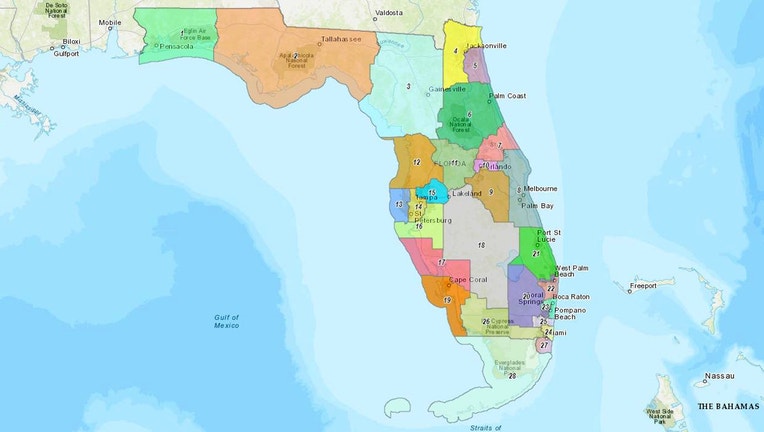Florida fires back in congressional redistricting lawsuit

TALLAHASSEE, Fla. - Attorneys for Secretary of State Laurel Lee fired back Monday at an attempt to block a new congressional redistricting plan, saying plaintiffs in a lawsuit want to "revert to some racially gerrymandered" map that would stretch a district across a swath of North Florida to elect a Democrat.
Lee’s attorneys filed the arguments two days before Leon County Circuit Judge Layne Smith is scheduled to hold a hearing on a request for a temporary injunction to block the redistricting plan, which Gov. Ron DeSantis pushed through the Legislature last month.
The case centers on Congressional District 5, which in recent years has stretched from Jacksonville to west of Tallahassee and has tied together communities to help elect a Black candidate. The district is held by U.S. Rep. Al Lawson, a Black Democrat.
DeSantis contended that the sprawling district was unconstitutionally gerrymandered, and the plan passed by the Republican-dominated Legislature condensed the district in the Jacksonville area. Voting-rights groups and other plaintiffs filed the lawsuit and a motion for a temporary injunction, arguing that the new map violates part of a 2010 state constitutional amendment that bars diminishing the ability of minority voters to "elect representatives of their choice."
But in the 18-page response Monday, Lee’s attorneys said keeping the current sprawling configuration of District 5 would violate the Equal Protection Clause of the U.S. Constitution. The response contended that the clause bars "race-based sorting of voters" without a "compelling interest" and a "narrowly tailored" means to achieve that interest.
"Plaintiffs have made no attempt to demonstrate how the race-based district they propose could satisfy this high constitutional bar," Lee’s attorneys wrote. "Indeed, they couldn’t do so, even if they tried."
Also, Lee’s attorneys argued that the Equal Protection Clause trumps the 2010 state constitutional amendment — known as the "Fair Districts" amendment. That is because of the U.S. Constitution’s Supremacy Clause, which generally gives precedence to federal laws over state laws.
"Importantly, however, the U.S. Supreme Court has never even hinted that compliance with a race-based provision of a state constitution can serve as justification for avoiding the federal guarantees of equal protection," Lee’s attorneys wrote. "This is for good reason: It would turn the U.S. Constitution’s Supremacy Clause on its head."
Voting-rights groups, such as the League of Women Voters of Florida, and individual plaintiffs filed the lawsuit April 22 and quickly asked for a temporary injunction. They focused the lawsuit on District 5 and what is known as the "non-diminishment" clause of the Fair Districts amendment.
"A temporary injunction is warranted here because plaintiffs are likely to succeed on the merits of their claim that the DeSantis plan violates the non-diminishment provision of … the Florida Constitution by dismantling the former Congressional District 5, a North Florida district in which Black voters were previously able to elect their candidates of choice," the motion said. "Rather than preserve a North Florida district where Black voters would retain their ability to elect their candidates of choice to Congress, the DeSantis plan cracks Black voters among four majority-white districts, thus diminishing their voting strength in violation of the Fair Districts amendment."
Also, the plaintiffs argued that enough time remains to revamp the redistricting plan, as primary elections are scheduled for Aug. 23.
"While plaintiffs have challenged the DeSantis plan in its entirety, this motion seeks temporary relief solely on the ground that the elimination of CD-5 violates the Florida Constitution’s non-diminishment standard," a memorandum filed with the motion said. "Any injunction would therefore be limited to a handful of districts in North Florida and thus would not impact election preparations throughout most of the state."
But the state’s response Monday said county elections supervisors have already started to make preparations for this year’s elections with the new map. The response cited statements by supervisors in Duval and Columbia counties.
Also, the response argued that plaintiffs had not shown the new map would diminish the ability to elect Black candidates, saying that, at "best, they show an inability to elect Democratic candidates."
"In sum, the non-diminishment provision wasn’t put in place to mandate a safe Democratic congressional district," the state’s attorneys wrote. "Plaintiffs must disentangle partisanship from race before they can trigger the non-diminishment provision."
DeSantis called last month’s special session after vetoing a congressional redistricting plan passed in March by the Legislature. Republicans during the special session went along with a map proposed by DeSantis, despite fierce opposition that included Democratic lawmakers holding a rare protest that temporarily shut down House floor proceedings.
Along with Lee, the lawsuit names as defendants Attorney General Ashley Moody and legislative leaders. Moody’s office filed a response Monday that argued she was an "improper defendant" in the lawsuit. A response from legislative leaders had not been posted on the court docket as of mid-afternoon Monday.

